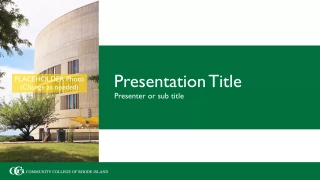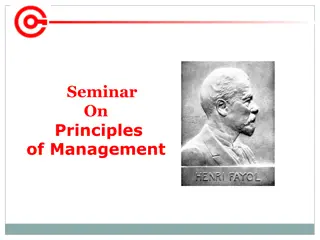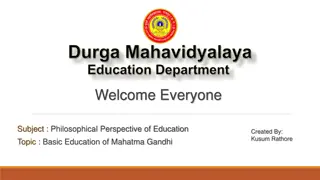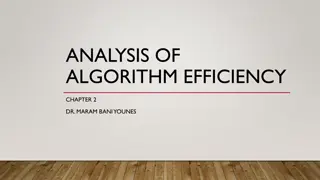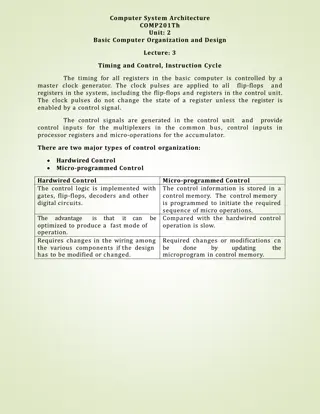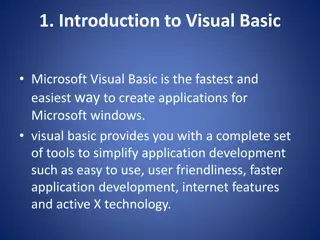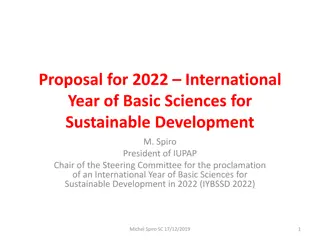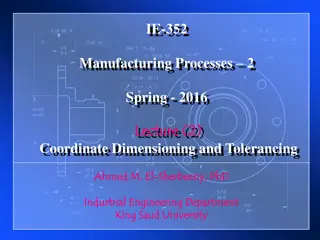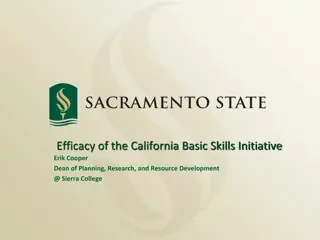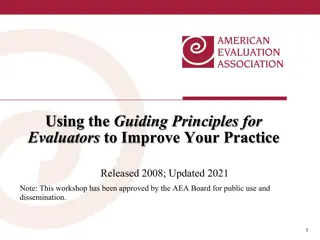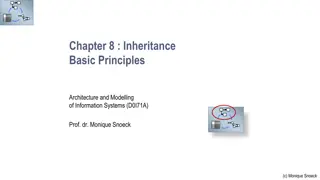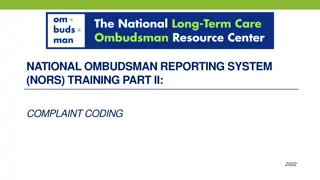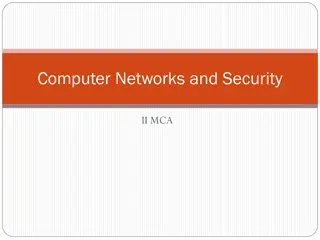Improving Outcomes in Basic Reading, Mathematics, and ESL Literacy
This presentation highlights the significant improvement in outcomes for basic reading (57%), basic mathematics (82%), and ESL literacy (71%). It discusses the factors contributing to these improvements and showcases the potential for further progress.
5 views • 11 slides
Basic Education 2020/21-2024/25 Strategic Plan Presentation Overview
This presentation outlines the purpose, size, and shape of the Basic Education sector, focusing on the Department of Basic Education's Annual Performance Plan for 2023/24. It highlights government priorities, actions towards realizing Schooling 2030, progress on deliverables, budget allocations, and
3 views • 75 slides
Principles of the Ghana Civil Service Code of Conduct
The Code of Conduct for the Ghana Civil Service, outlined by Elizabeth Obeng-Yeboah, emphasizes principles such as abiding by the constitution and laws with dignity, integrity, and professionalism. It sets standards for conduct, avoiding conflicts of interest, maintaining political neutrality, and u
1 views • 34 slides
Annual Performance Plan 2023/24 for Basic Education Sector
The Annual Performance Plan 2023/24 for the Basic Education sector outlines strategic priorities, government initiatives, and progress towards educational goals aligned with the National Development Plan. The presentation covers key areas such as sector size, educational system structure, language d
0 views • 75 slides
Understanding the Basic Principles of Surveying for Building and Structural Projects
Surveying plays a crucial role in ensuring accurate positioning and alignment of structures such as buildings, bridges, and roads. This article delves into the definition of surveying, stages in the surveying process including reconnaissance, field work and measurement, and office work. Understandin
1 views • 60 slides
Academic Freedom and Shared Governance in Higher Education
Academic Freedom and Shared Governance are foundational principles advocated by the American Association of University Professors (AAUP) to ensure educators have the freedom to explore, research, teach, and discuss without censorship. These principles empower educators to enhance student learning an
0 views • 9 slides
Essential Principles of Management Discussed in Seminar
Explore the foundational principles of management discussed in a seminar on principles of management. Delve into topics such as division of work, authority, discipline, unity of command, and unity of direction as outlined by Henri Fayol. Gain insights into the importance of these principles for effe
0 views • 22 slides
Durga Mahavidyalaya
Education is viewed as the acquisition of knowledge, skills, beliefs, and moral habits. Mahatma Gandhi introduced his Basic Education concept emphasizing free and compulsory education, mother tongue instruction, craft-centered learning, moral education, and character building. The curriculum include
0 views • 6 slides
Counting Principles and Pigeonhole Principle Explained
Explore the concepts of counting principles and the pigeonhole principle through practical examples and tips. Learn how to apply these principles to solve problems effectively. From understanding basic counting rules to the advanced pigeonhole principle, this content provides insights and guidance o
1 views • 35 slides
Training Module on Teaching Basic First Aid for Physical Health and Wellbeing
This training module focuses on teaching basic first aid as part of physical health and mental wellbeing. It provides guidance, strategies, and resources for educators to enhance their teaching skills in this critical area. By the end of the training, participants will have a better understanding of
0 views • 104 slides
International Law of War: Nuremberg Principles and Accountability
The Nuremberg Principles, derived from the trials of Nazi officials for war crimes, establish accountability in international law. These principles hold individuals responsible for committing acts considered crimes under international law, regardless of their position or orders received. The assumpt
2 views • 22 slides
Promoting Ethical Principles in Social Science Research
Explore the challenges and strategies for translating and applying ethical principles, especially in emergency contexts. Learn key questions in social science research and how to ensure information contributes to community actions. Understand the importance of considering ethical principles in all w
0 views • 21 slides
Understanding Algorithm Efficiency Analysis
In this chapter, Dr. Maram Bani Younes delves into the analysis of algorithm efficiency, focusing on aspects such as order of growth, best case scenarios, and empirical analysis of time efficiency. The dimensions of generality, simplicity, time efficiency, and space efficiency are explored, with a d
1 views • 28 slides
Basic Computer Organization and Design - Timing and Control
The timing of all registers in a basic computer is governed by a master clock generator, with clock pulses controlling the flip-flops and registers in the system. Two main types of control organization are Hardwired Control and Micro-programmed Control. The former uses digital circuitry like gates a
1 views • 4 slides
Introduction to Visual Basic for Windows Application Development
Microsoft Visual Basic is a powerful tool for creating applications on the Windows platform. It offers a user-friendly environment with features such as event-driven programming, GUI creation, and integration with ActiveX technology. The IDE makes development tasks like design, editing, compiling an
3 views • 27 slides
Binary Basic Block Similarity Metric Method in Cross-Instruction Set Architecture
The similarity metric method for binary basic blocks is crucial in various applications like malware classification, vulnerability detection, and authorship analysis. This method involves two steps: sub-ldr operations and similarity score calculation. Different methods, both manual and automatic, ha
0 views • 20 slides
Enhancing Basic Education Curriculum Framework for Effective Implementation
Explore the Basic Education Curriculum Framework, learning outcomes, key areas covered, suggested learning experiences, and vision statements for curriculum reforms in Kenya. Dive into the national goals of education, core competencies, and organization of basic education to empower educators and st
0 views • 47 slides
Addressing Basic Needs Insecurities at Mt. San Antonio College
Developing a cross-campus approach to address basic needs insecurities at Mt. San Antonio College is crucial for student success. The initiative aims to understand the problem of food and housing insecurities, implement solutions like CalFresh and food pantries, and generate collaborative ideas. Stu
0 views • 19 slides
Study Guide for Principles of Management Course at Africa Research University (ARU)
Welcome to Africa Research University (ARU)! This study guide is designed to help you navigate through the Principles of Management course (Course Code: PRM4) at ARU. It provides an introduction to the course content, emphasizing the importance of developing management skills to effectively lead and
1 views • 40 slides
Key Principles of Insurance Explained with Visuals
Understanding the principles of insurance is crucial for both insurance seekers and companies. The principles include Utmost Good Faith, Insurable Interest, Indemnity, Contribution, and Subrogation. These principles ensure transparency, fairness, and protection for policyholders. Visual representati
0 views • 6 slides
Principles of Training: Overload, Specificity, and Progression
Principles of training encompass overload, specificity, and progression. Overload requires doing more than usual, specificity involves tailored activities, and progression ensures gradual advancement. These principles are vital for improving fitness levels safely and effectively, emphasizing the nee
8 views • 17 slides
Celebrating Basic Sciences in 2022 for Sustainable Development
The proposal suggests declaring 2022 as the International Year of Basic Sciences for Sustainable Development, aiming to highlight the crucial role of curiosity-driven basic sciences in societal, environmental, and economic progress. Recognizing the significant contributions of basic sciences to vari
5 views • 13 slides
Understanding Basic Hole and Shaft Systems in Manufacturing Processes
Basic Hole and Shaft Systems are essential procedures for determining mating part dimensions and tolerance information in manufacturing drawings. By knowing parameters such as Basic Size, Allowance, Hole Tolerance, and Shaft Tolerance, accurate and functional parts can be produced. This system ensur
0 views • 36 slides
Understanding John Rawls' Contractualism and the Deontological Tradition
Explore John Rawls' Contractual Theory of Justice within the deontological tradition. Rawls introduces the original position and the veil of ignorance to establish fair and impartial principles of justice. Discover Rawls' principles of justice, focusing on basic liberties, social and economic inequa
0 views • 9 slides
Effective Partnership and Mutual Accountability in Nutrition Clusters
The content discusses the minimum commitments needed for participation in Nutrition Clusters, explains the Principles of Partnership, and explores how these principles can enhance coordination and accountability to affected populations. It emphasizes partner commitments, such as leadership, mainstre
0 views • 7 slides
Overview of Fundamental Principles of Space Law and Outer Space Treaties
The content discusses the fundamental principles of space law highlighted at the United Nations Space Law Conference 2020, focusing on key treaties such as the Outer Space Treaty of 1967 and associated rights, duties, and obligations of states in space exploration and use, including non-appropriatio
0 views • 16 slides
Efficacy of the California Basic Skills Initiative by Erik Cooper
Detailed examination of the California Basic Skills Initiative led by Erik Cooper, highlighting the importance of basic skills in college success. The initiative focuses on foundational skills in reading, writing, math, and English as a Second Language, aiming to address the remediation needs of a s
0 views • 34 slides
Overview of Directive Principles of State Policy in Indian Constitution
Directive Principles of State Policy (DPSP) in the Indian Constitution encompass social, economic, and political programs aimed at realizing ideals of justice, liberty, equality, and fraternity. They are non-justiciable but guide the state in legislative matters. Classified into Socialistic, Gandhia
0 views • 24 slides
Understanding FAIR Principles in Biomedical Research
The FAIR principles - Findable, Accessible, Interoperable, and Reusable - provide a framework for ensuring scientific data in biomedical research is managed and shared effectively. This informative session delves into the theory and practice of FAIR principles, emphasizing the importance of data qua
0 views • 28 slides
The FAIR Principles for Data Management and Stewardship
Embrace the FAIR principles - Findable, Accessible, Interoperable, Re-usable - for effective scientific data management and stewardship. Learn how annotations enhance data FAIRness and the key attributes of each principle. Dive into the high-level guiding principles that ensure data is globally uniq
0 views • 25 slides
Understanding the Guiding Principles for Evaluators
This content provides insights into the Guiding Principles for Evaluators, including their history, assumptions, and key principles such as Systematic Inquiry and Competence. The workshop aims to increase knowledge about ethical evaluation practices and stimulate discussions within the evaluation co
0 views • 22 slides
Guiding Principles for GETSI/INTEGRATE Webinar – Materials Development and Goals
The webinar presented by David Steer from the University of Akron focuses on guiding principles for material development in the context of GETSI/INTEGRATE modules. It outlines goals for the session, including discussing components of the guiding principles, examples of meeting those principles, and
0 views • 13 slides
Basic Principles of Inheritance in Information Systems
Understanding inheritance in information systems is crucial for designing efficient architectures. This chapter delves into the principles of inheritance, such as attribute and method inheritance, generalization, and subtype hierarchies. It also discusses the modeling of inheritance through UML nota
0 views • 71 slides
Understanding Henri Fayol's 14 Principles of Management
Henri Fayol, the Father of Modern Management, introduced 14 Principles of Management in 1916, outlining essential guidelines for effective management. These principles cover areas such as division of work, authority and responsibility, discipline, unity of command, and unity of direction. By followi
0 views • 19 slides
Principles of Management: Understanding Henri Fayol's 14 Key Principles
Explore the foundational principles of management through the lens of Henri Fayol's 14 key principles, which offer valuable insights into managerial decision-making and organizational interactions. Delve into the history of Henri Fayol, his contributions to management theory, the concept of authorit
0 views • 14 slides
Understanding Basic Engine Operation Principles
Explore the physical principles related to engine operation, energy conversion, and the basic parts of a gasoline engine assembly. Learn about atmospheric pressure, vacuum, temperature-pressure-volume relationship, states of matter, and how engines and motors convert energy. Dive into the components
0 views • 37 slides
Legal Principles of Insurance
The legal principles of insurance include indemnity, insurable interest, subrogation, and utmost good faith. These principles ensure fair compensation, financial risk protection, and honesty in insurance contracts. Understanding these principles is crucial for both insurers and policyholders to navi
0 views • 18 slides
Complaint Coding Training for National Ombudsman Reporting System (NORS) 2022
Explore the Complaint Coding Training materials for the National Ombudsman Reporting System (NORS) 2022. Part II covers Basic Principles, Complaint Codes, Definitions, Examples, Quiz, and Resources. Learn about coding complaints, using perpetrator codes, and reporting tips. Access documents such as
0 views • 113 slides
Understanding Network Security Principles and Techniques
Explore the fundamental concepts of network security, including issues of confidentiality, integrity, and non-repudiability. Learn about the challenges of securing networks and the types of attacks that computer systems face. Dive into basic security techniques like hashing and symmetric key cryptog
0 views • 36 slides
Understanding Common Basic Principles of Insurance Contract Law in Europe
Explore the common basic principles of insurance contract law in Europe, including insurable interest, indemnity, utmost good faith, and contract of adhesion. Delve into the conflict of insurance cultures, comparing Alpine and Maritime approaches with insights on insurance intermediation practices.
0 views • 12 slides
